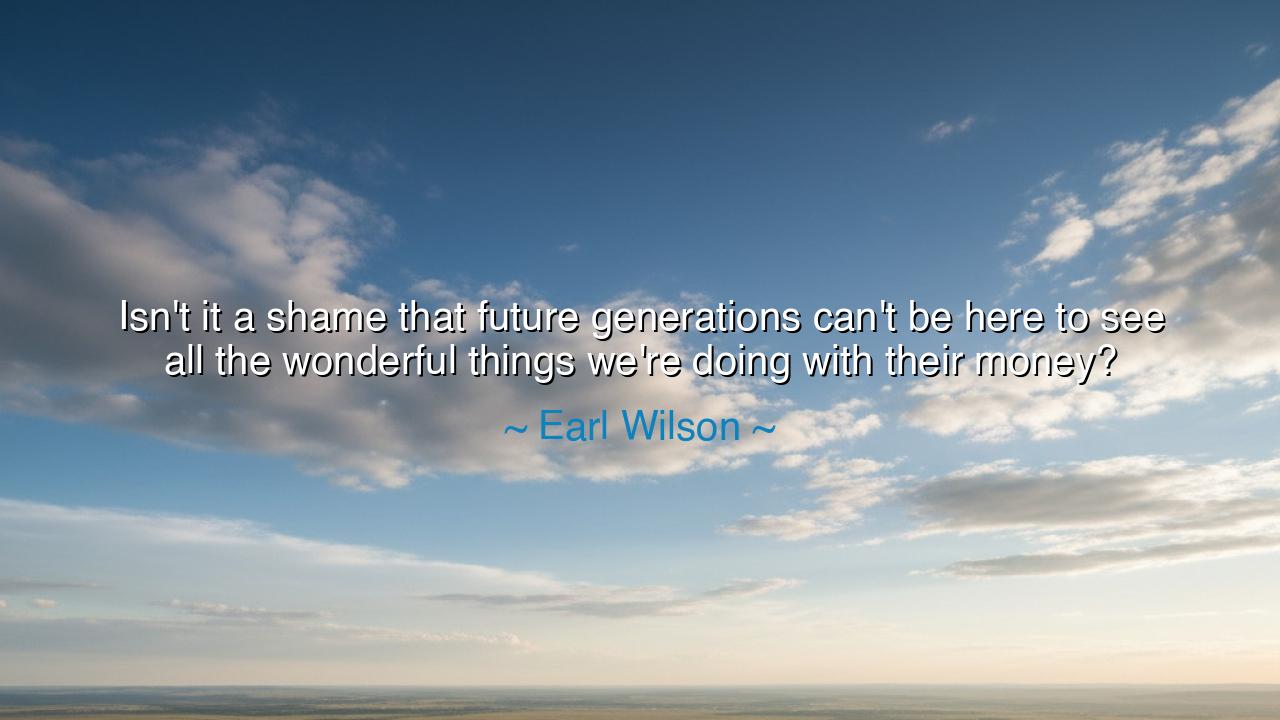
Isn't it a shame that future generations can't be here to see all
Isn't it a shame that future generations can't be here to see all the wonderful things we're doing with their money?






In the annals of human history, there have always been those who acted with foresight, considering the legacy they would leave for future generations. Earl Wilson, in his wry observation, "Isn't it a shame that future generations can't be here to see all the wonderful things we're doing with their money?" reflects a profound truth about the choices we make today and their lasting impact on those who will come after us. His words, though laced with irony, speak to a reality that we must all face: we are not just stewards of our own time and resources, but of the world we will leave behind. The wealth, the land, the resources of today—so often spent without thought—are not truly ours; they belong to those who will inherit them long after we are gone.
In the ancient world, the concept of legacy was of paramount importance. The great civilizations of Greece, Rome, and Egypt were built with a view toward the future, often glorifying the rulers who contributed to the prosperity and growth of their people. Alexander the Great and Julius Caesar both sought to create empires that would endure through the ages. They understood that their actions today would shape the destinies of countless generations to come. Yet, the question remains: are we, like these ancient figures, mindful of how our actions today will affect those who follow, or do we squander the resources entrusted to us for short-term gain, neglecting the needs of tomorrow?
This brings to mind the tale of the fall of Rome, a civilization that once stood as the pinnacle of power and achievement. As the empire expanded, its leaders were consumed by luxury and excess, often spending vast sums on grand spectacles and personal indulgences, rather than investing in the future of their people. The wealth of Rome, accumulated over centuries, was eventually depleted by mismanagement and short-sightedness, leaving nothing for the generations that would inherit the empire. What Rome’s rulers failed to grasp was that prosperity is not just the accumulation of wealth, but the wise use of it to build something that endures. The lesson here is clear: the failure to consider future generations leads not to immortality, but to decay.
Similarly, in the modern world, the rising debts and environmental costs of our actions are an urgent reminder of the importance of foresight. We live in an age where the decisions made by the powerful—whether governments or corporations—often prioritize short-term profits over the long-term welfare of the planet and its people. Our natural resources are being consumed at an alarming rate, and the future generations who will inherit this planet may not see the same world we enjoy today. This is why Wilson’s quote is so profoundly relevant: it is a reflection on the irony of how we squander the wealth of the present, often for the benefit of a few, while disregarding the long-term consequences for those who will follow.
Yet, the past is not without its examples of wise rulers who thought not of their own time, but of the generations to come. King Ashoka of ancient India is one such figure. After his early years of violent conquest, Ashoka experienced a profound transformation and sought to leave a legacy of peace and prosperity. His reforms were aimed at improving the welfare of his people and ensuring that his actions would benefit future generations. His efforts, reflected in his Edicts, promoted social welfare, tolerance, and the preservation of nature. Ashoka understood that the true measure of a ruler was not in the wealth they amassed, but in the lasting impact they left on the world. His example stands as a powerful reminder that, while resources can be fleeting, the values we impart can endure through the ages.
The lesson of Wilson's words is one that speaks to us all: our actions today, especially when it comes to the resources we use and the decisions we make, are not just for our benefit. We are entrusted with the care of the world, not as its owners, but as stewards for those who will inherit it. Just as ancient rulers were called to build legacies that would endure, so too are we responsible for ensuring that the future is not burdened by our mistakes. Whether it is the environmental costs of unchecked growth or the debt passed down through generations, we must ask ourselves: Are we creating a world that will allow future generations to flourish, or are we leaving them a legacy of ruin?
Let us reflect on this truth: the wealth we possess today—whether it is in material goods, natural resources, or the opportunities we create—should not be squandered for fleeting pleasure or personal gain. We are entrusted with these blessings not just for our own time, but for those who come after us. Just as the great leaders of the past understood that their actions would ripple through time, we must understand that our choices, however small, will echo through the generations. Let us use our resources wisely, honor the future, and build a legacy that ensures prosperity and well-being for the generations yet to come. In this way, we can create a world where those who follow will not only be grateful for what we left them, but will continue the work of building something even greater.






AAdministratorAdministrator
Welcome, honored guests. Please leave a comment, we will respond soon